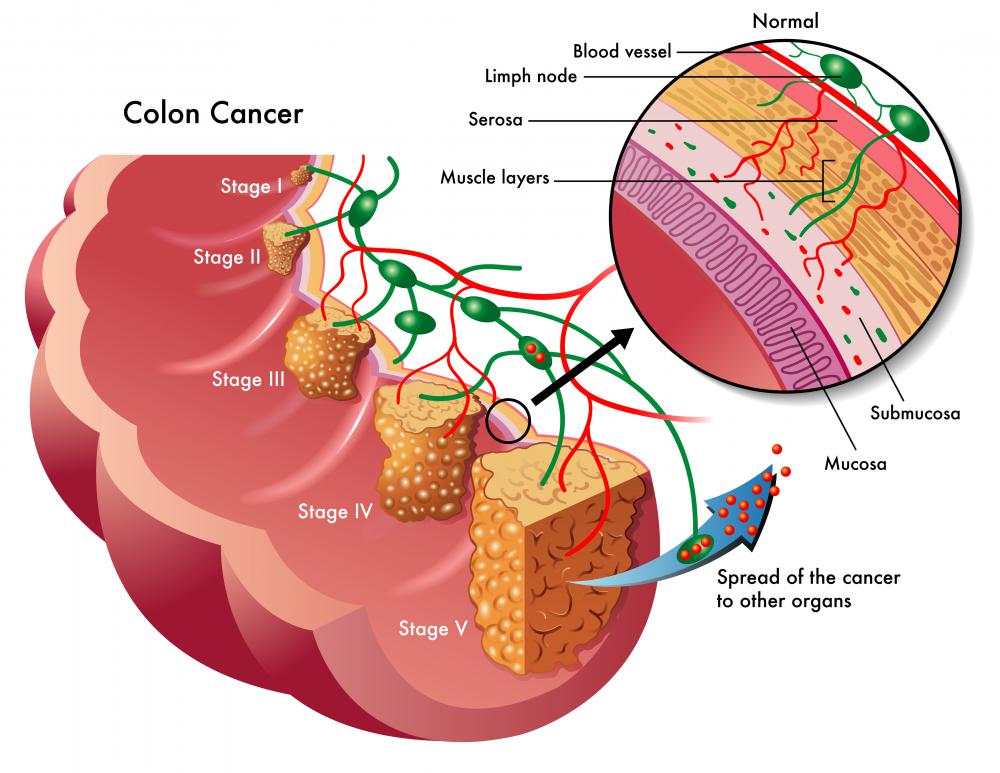At WiseGEEK, we're committed to delivering accurate, trustworthy information. Our expert-authored content is rigorously fact-checked and sourced from credible authorities. Discover how we uphold the highest standards in providing you with reliable knowledge.
What Factors Affect Colon Cancer Life Expectancy?
Colon cancer life expectancy depends on a number of factors, including a patient’s overall health status. The stage of colon cancer determines how difficult treatment is, and leftover cancer cells after surgery can affect the patient's prognosis. Recurring colon cancer also decreases a patient’s life expectancy. Survival usually is greater when cancer cells are detected early.
There are five levels of colon cancer, ranging from Stage 0 to Stage 4. Stage 0 is the least severe, because the cancer cells have yet to spread throughout the colon and rectum. Colon cancer patients are diagnosed with Stage 1 if the tumors have spread but are still within the colon. The cancer usually spreads to the rectum in patients who have Stage 2 colon cancer.

Cancer cells spread to other parts of the body in the latter stages of colon cancer, making the condition more difficult to treat. Patients who have Stage 3 colon cancer might experience the spread of cells to lymph nodes. Stage 4 is generally the most difficult to treat, because cancer cells have spread from the colon to other parts of the body, including major organs. Colon cancer also can be classified as recurrent, which means that cancer cells periodically reappear despite aggressive treatment.

Colon cancer life expectancy is directly related to the stage of cancer a patient has been diagnosed as having. It usually is easier to treat colon cancer if it is isolated in one area rather than being in multiple places in the body. Blood tests, colonoscopies, computed tomography (CT) scans and X-rays are common tools used to diagnose colon cancer. Determining the stage of colon cancer is sometimes difficult, and an oncologist might not be able to make an accurate diagnosis until the treatment process begins.

In some cases, colon cancer cells might multiply so aggressively that they create a hole in the colon. This can occur during any stage of colon cancer. Such a phenomenon might decrease colon cancer life expectancy, because the malignant cells have a greater opportunity to quickly spread throughout the body.
Surgery is generally the most common method of colon cancer removal. This method is even used in the earliest stages of colon cancer to get rid of malignant cells. An oncologist might follow surgery with chemotherapy to ensure that all colon cancer cells are removed from the body.
In some cases, colon cancer can recur after surgery and chemotherapy. Usually, a patient will undergo more surgery or chemotherapy to destroy the new cancer cells. Recurring malignant cells might decrease a patient’s colon cancer life expectancy.

Healthy lifestyle habits can also affect colon cancer life expectancy. A high-fiber and low-fat diet aids colon health by keeping the intestines clear. Regular exercise is also sometimes linked to a decreased chance of colon cancer recurrence and might help patients recover from any stage of colon cancer. Patients who are recovering from surgery can ask their doctor for diet and exercise advice before embarking on a new lifestyle plan.
AS FEATURED ON:
AS FEATURED ON:
















Discussion Comments
Colon cancer can be so treatable, but when it isn't and it comes back, it's awful. A dear lady who went to our church had it four times before it finally got her. Three of her four sons have had it, and one has died from it. It was so terrible seeing her like that, but she never lost her spirit. She laughed and joked until the very end. She knew her eternity was assured, and she faced it without fear, but with joy and courage. Gosh, but I miss her!
It's enough to make you get that colonoscopy appointment...
In general, the one good thing about colon cancer is it usually grows slowly, so most of the time, doctors can find it in earlier stages when it is easier to treat, and the prognosis is more positive.
Even older people can have a good prognosis if it's caught early. My friend's mom was something like 88 when she was diagnosed. She's 94 and still going! She got through the chemo and did well, especially considering her age. I told my friend her mom is an official member of the Tough Old Bird Club. She told her mom, who thought that was funny, and agreed with me.
Post your comments